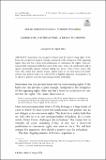Files in this item
Lesser-evil justifications : a reply to Frowe
Item metadata
| dc.contributor.author | Gordon-Solmon, Kerah | |
| dc.contributor.author | Pummer, Theron Gene | |
| dc.date.accessioned | 2022-08-04T08:30:11Z | |
| dc.date.available | 2022-08-04T08:30:11Z | |
| dc.date.issued | 2022-08-04 | |
| dc.identifier | 278011756 | |
| dc.identifier | febceded-a121-467f-9bb8-ea0995a90fb5 | |
| dc.identifier | 85135585995 | |
| dc.identifier | 000836154400001 | |
| dc.identifier.citation | Gordon-Solmon , K & Pummer , T G 2022 , ' Lesser-evil justifications : a reply to Frowe ' , Law and Philosophy , vol. First Online . https://doi.org/10.1007/s10982-022-09454-w | en |
| dc.identifier.issn | 0167-5249 | |
| dc.identifier.other | ORCID: /0000-0003-0147-9917/work/116910328 | |
| dc.identifier.uri | https://hdl.handle.net/10023/25769 | |
| dc.description | For funding, Kerah Gordon-Solmon is grateful to the Social Sciences and Humanities Research Council of Canada. | en |
| dc.description.abstract | Sometimes one can prevent harm only by contravening rights. If the harm one can prevent is great enough, compared to the stringency of the opposing rights, then one has a lesser-evil justification to contravene the rights. Non-consequentialist orthodoxy holds that, most of the time, lesser-evil justifications add to agents’ permissible options without taking any away. Helen Frowe rejects this view. She claims that, almost always, agents must act on their lesser-evil justifications. Our primary task is to refute Frowe’s flagship argument. Secondarily, it is to sketch a positive case for nonconsequentialist orthodoxy. | |
| dc.format.extent | 8 | |
| dc.format.extent | 181408 | |
| dc.language.iso | eng | |
| dc.relation.ispartof | Law and Philosophy | en |
| dc.subject | Lesser-Evil Justifications | en |
| dc.subject | Helen Frowe | en |
| dc.subject | B Philosophy (General) | en |
| dc.subject | T-NDAS | en |
| dc.subject.lcc | B1 | en |
| dc.title | Lesser-evil justifications : a reply to Frowe | en |
| dc.type | Journal article | en |
| dc.contributor.institution | University of St Andrews. Centre for Energy Ethics | en |
| dc.contributor.institution | University of St Andrews. Centre for the Study of Philanthropy & Public Good | en |
| dc.contributor.institution | University of St Andrews. Centre for Ethics, Philosophy and Public Affairs | en |
| dc.contributor.institution | University of St Andrews. Philosophy | en |
| dc.identifier.doi | 10.1007/s10982-022-09454-w | |
| dc.description.status | Peer reviewed | en |
| dc.date.embargoedUntil | 2022-08-04 | |
| dc.identifier.url | https://philpapers.org/rec/GORLJA | en |
This item appears in the following Collection(s)
Items in the St Andrews Research Repository are protected by copyright, with all rights reserved, unless otherwise indicated.

